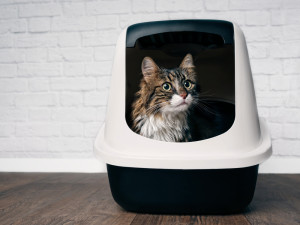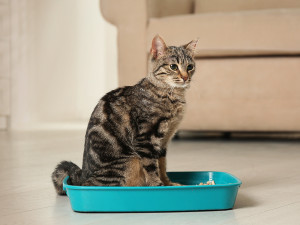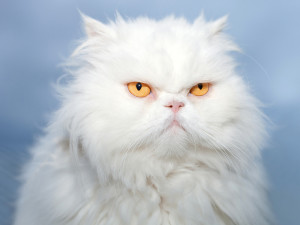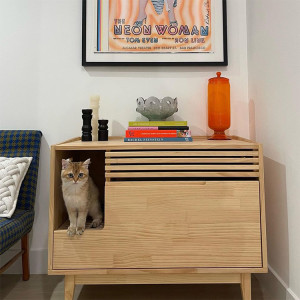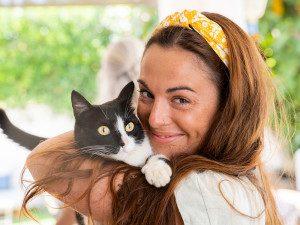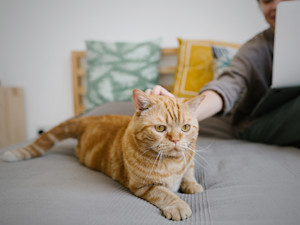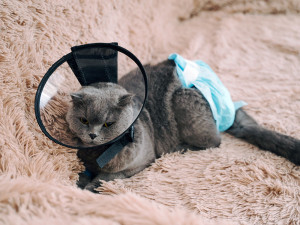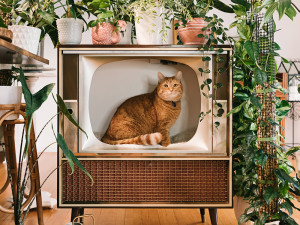What to Do When Your Cat Refuses to Be (Litter) Boxed In
An expert explains why kitties are so particular about where they pop a squat.
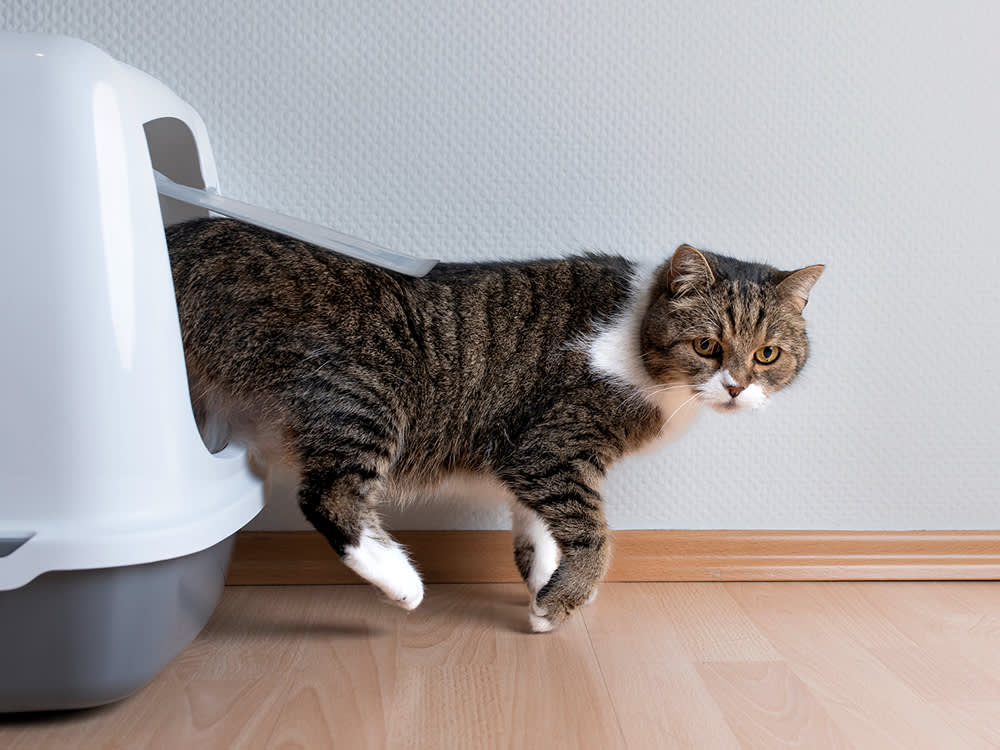
Share Article
In This Article:
When Is Going Outside the Litter Box a Problem? 7 Reasons Your Cat Isn’t Using the Litter Box How to Make the Perfect Litter Box Environment What to Know About Declawed Cats and Litter Boxes Getting Your Cat to Use the Litter Box Again When to Seek Professional Help
Generally, cats can teach dogs a thing or two about doing their business. If you let them, a dog will walk right past a tree to lift their leg on your neighbor’s car rims, then strategically poop at the bottom of another one’s stoop. Besides the fact that cats can be trained to use a human toilet (haven’t you seen Meet the Parents?), these diminutive geniuses will politely regulate their BMs to a litter box — that is, until they won’t.
It turns out there’s a lot more going on in a litter box than numbers one and two. Just think of your own five-step nightly skincare routine — cats have their particular habits, too. While they’re not exactly trying the latest pore serum in there, cats do get up to other activities in their litter boxes, including guarding and playing in them.
But avoiding the litter box altogether? Not cool, kitty. We caught up with Dr. Niwako Ogataopens in new tab, director of the Purdue Animal Behavior Clinic at Purdue University, to get the scoop (pun intended) on why this happens and what you can do about it.
Main takeaways
Your cat may stop using the litter box due to medical conditions, environmental changes, or issues with the litter box itself.
Cats have individual preferences when it comes to litter box style, size, and location. It’s best to opt for a large litter box and place it in a quiet, private location. Some cats are cool with a covered box, while others may refuse to use them.
Each cat also has their preference when it comes to litter type. Many cats prefer unscented, finely ground, clumping litter.
It’s important to have enough litter boxes. A general rule is one litter box per cat, plus one more.
Consider consulting a veterinary behaviorist if your cat refuses to use the litter box.

When is going outside the litter box a problem?
An easy way to get the evil eye from a cat parent is to tell them that pee outside of the litter box is no big deal. It’s always a big deal. For cat parents, it's a smelly nuisance. For cats, it can be their signal that something is wrong. Cats may avoid the litter box due to medical, environmental, or behavioral issues, so house soiling by cats should not be ignored.
7 reasons why your cat isn’t using the litter box
1. Change is bad: There’s something new in your cat’s environment
OK, change is good, but don’t expect your cat to be down with it. Many pet parents believe their animals spite-pee and revenge-poop to show their disapproval for something, like losing sleeping-in-bed privileges thanks to a new partner. The argument can be very convincing, especially when they seek out your pillow — when there are umpteen less gross, but equally rude, locations to stage a protest. But Dr. Ogata says anxiety is more likely to blame when a cat won’t use the litter box, adding that cats are notoriously fussy creatures who may react to the slightest change in their environment, even just a new type of litter.
2. Location, location, location
The grass is always greener…or the rug softer. Maybe it’s the downy material or the absorbency or how it’s just so nice to knead. The jury’s out as to why many cats prefer rugs to litter boxes, but if yours is guilty, either limit their access to the room with the rug in question or spray it with a sour-smelling deterrent. Another favorite place to “go” — which admittedly makes more sense — is in a potted plant, where they can bury their business. If your cat has abandoned the litter box (or never attempted to use it in the first place), consider where it is located.
3. Size matters: Your litter box is too small
Most cats prefer larger litter boxes and litter made from small, clay granules (as opposed to silica or wood pellets). Some may not care for privacy and avoid litter boxes with lids. Dr. Ogata also says that you should pass on litter boxes disguised as household objects such as side tables and ceramic pots. They are purely aesthetic — something your cat will not appreciate (and then proceed to poop under the bed). She adds that “an open shape is better.”
4. Using the litter box is uncomfortable
“If there is a sudden change in litter box habits, make an appointment with the vet to rule out medical causes,” Dr. Ogata says. Cats can get UTIs, which cause pain when they pee. They could assume that the litter box has something to do with it and may associate pain with their trips there. Also, your cat may want to use the box, but can’t physically get into it. Cats with arthritis, neurological disease, or chronic joint pain may not be able to cross the threshold to enter high-sided boxes.
5. You don’t have enough litter boxes
If you have multiple cats, you need multiple litter boxes. Dr. Ogata suggests one litter box per cat, plus one extra. So, two cats equal three litter boxes? That’s right. It’s not that your cats are divas. It’s just in their nature to be territorial. “In multi-cat households, cats can be bullies, and the aggressor can block access to the litter box,” she explains. Observe your kitties and place litter boxes where each one likes to spend time — the farther apart, the better.
6. Your cat has a health problem
Medical conditions can cause a change in a cat’s bathroom habits. Urinary tract infections, bladder stones, kidney disease, and diabetes can lead to inappropriate urination. Feline idiopathic cystitis (FIC) is a condition in which a cat’s urinary bladder is inflamed for an unknown reason. FIC can cause discomfort that can trigger a cat to pee outside of the box.
7. Clean up your act: Your litter box is dirty
Your cat feels about a dirty litter box the way you do about a dive bar’s restroom. The sight or scent of poop will send them running in the opposite direction. “The most important thing to a cat is the cleanliness and smell of a litter box,” Dr. Ogata says. “A spot that is wet, dirty, or smelly will deter them from going back.” And if they are well trained, they will hold it, which can cause bladder and kidney issues. If you’ve been eyeing automatic litter boxes, you may need to think twice. The unexpected motor noise or motion can startle sensitive cats.
How to make the perfect litter box environment for your cat
Add more litter boxes
It makes sense that having multiple cats calls for having multiple litter boxes. But sometimes it’s easy to forget that your cat may need more than one litter box even if they’re an only child. Remember this rule of thumb: One litter box per cat, plus one more.
Choose the right type of cat litter
Cats have a preference for what texture and scent of litter they use. Some cats will only use litter that feels like fine sand, while others are OK with silica crystals or other textures. Strong fragrances may be a turn-off as well. A general recommendation is to use fine-clumping litter that is either unscented or only lightly scented.
Get a large litter box
Cats are natural acrobats and contortionists, but they shouldn’t have to squeeze themselves into the litter box. Cats prefer to have some space, so go big or go home (or have your cat go outside the box).
Choose a private location away from dogs and kids
Cats like to poop in private just like everybody else. Place your cat’s litter box in a quiet area, away from boisterous kids, intrusive dogs, and noisy appliances. Dr. Ogata recommends a quiet, private area that’s easily accessible and far from their food and water bowls — but not so far that it shares the basement with a scalding furnace or the laundry room with loud, clanking machines.
Keep the litter box clean
Get into the habit of scooping out the litter box at least once a day and scrubbing it clean at least once a week — set an alarm on your phone as a reminder. Your cat will thank you by pooping where they are supposed to. Note: Not every cat will appreciate the noise of an automatic litter box cleaner and will insist that you complete this task yourself.
What to know about declawed cats and litter box problems
An onychectomy (commonly called a declaw) is a surgical procedure that removes the third phalanx, or bone, of each digit — not just the nail. During recovery, cats must use alternative litter materials such as shredded newspaper or commercial cat litter made of recycled paper for 10 to 14 days to keep their paws clean and dry. Some cats may see this material as an inappropriate place to go and eliminate elsewhere. While many declawed cats do not develop litter box issues, some may continue to soil outside the box even after recovery.
Reports on the connection between declawing and inappropriate urination are mixed. Some studies suggest the procedure increases the likelihood of inappropriate urination, while other reports claim no difference in behavior. There is concern that chronic or phantom pain may contribute to chronic house soiling in some cats. Despite these concerns, many declawed cats live without litter box problems, which should not deter you from adopting a declawed cat.
How to get your cat to use the litter box again
Here are some things cat parents can consider to support good litter box habits.
Provide your cat with more than one spacious litter box, placed in quiet, low-traffic areas.
Clean the litter box more frequently than you used to.
Establish a routine and a sense of normalcy to minimize the stress of any changes at home.
Keep big changes at home to a minimum whenever possible.
Keep the atmosphere calm by using tools such as pheromone diffusers.
Help your cat with their anxiety by providing regular playtime and access to quiet, secure spaces.
Is your cat still not using the litter box? Here’s when to seek professional help
You’ve added extra litter boxes, upgraded to larger ones, and performed “trial and error” with different types of litter — and nothing worked. Your cat just peed on your laundry, and you’re beyond frustrated. What now?
If your veterinarian has ruled out any medical conditions and you’ve done everything to make your home cat-friendly, it may be time to consult a specialist. Talk to your vet about a referral to a veterinary behaviorist for expert guidance.
Bottom line
If your cat starts refusing to use the litter box, consult with your veterinarian to look for underlying medical issues.
Make sure you’re meeting your cat’s needs by providing an adequate number of litter boxes and placing them in quiet areas.
Clean your cat’s litter box regularly.
If all else fails, consult a veterinary behaviorist.
FAQs
How many litter boxes do you need?
A good rule of thumb for the number of litter boxes in cat households is one litter box per cat, plus one more.
What's the difference between clumping and non-clumping cat litter?
Clumping cat litter forms a “clump” when it comes into contact with moisture, making it easier to scoop poop and pee out of the box. Non-clumping litter absorbs moisture, but does not clump cat waste together. Clumping cat litter tends to be more expensive.
Should you use scented or unscented cat litter?
Cats tend to prefer unscented cat litter. If using scented litter, aim for one that is lightly scented. Avoid using strong potpourris and air fresheners near the litter box.
Why is my senior cat not using the litter box?
Older cats can develop arthritis or mobility issues that make it difficult to get in and out of litter boxes with tall sides. Provide low-sided litter boxes to senior cats to improve accessibility.
References
Grigg, Emma K, et al. “Litter Box Preference in Domestic Cats: Covered versus Uncovered.” Journal of Feline Medicine and Surgery, vol. 15, no. 4, 26 Oct. 2012, pp. 280–284, https://doi.org/10.1177/1098612x12465606opens in new tab.
Martell-Moran, Nicole K, et al. “Pain and Adverse Behavior in Declawed Cats.” Journal of Feline Medicine and Surgery, vol. 20, no. 4, 23 May 2017, pp. 280–288, journals.sagepub.com/doi/full/10.1177/1098612X17705044, https://doi.org/10.1177/1098612x17705044opens in new tab.
“The Latest Scoop on Litter.” DVM 360, www.dvm360.com/view/latest-scoop-litteropens in new tab.

Jodi Helmer
Jodi Helmer is a North Carolina-based freelance writer who shares her home with an embarrassing number of rescue dogs and relies on four feral cats to patrol the barn. When she isn’t refilling food and water dishes, Jodi writes about animals for Scientific American, Sierra, WebMD, AKC Family Dog, Living the Country Life, and Out Here.

Dr. Alycia Washington, DVM, MS
Alycia Washington is a small-animal emergency veterinarian with over 10 years of experience based in North Carolina. She works as a relief veterinarianopens in new tab and provides services to numerous emergency and specialty hospitals. She also works as a veterinary writer with a focus on educating pet parents.
Related articles
![Small orange cat in wooden litter box.]()
9 Litter Box Enclosures That Aren’t Total Eyesores
Keep your cat’s litter box out of sight — but easy to scoop.
![Woman holding her black and white cat.]()
The Ultimate Shopping List for Your New Cat
It’s National Kitten Day! Here are all the new cat essentials you need, recommended by real pet parents.
![Owner pets senior ginger cat.]()
6 Common Health Concerns in Senior Cats
How to spot and how to treat them.
![Gray cat laying on a fuzzy pink blanket with a protective cone around its head and a blue diaper on]()
5 Best Cat Diapers of 2023
The top cat diapers to combat excitable urinators and leaking caused by incontinence, and help those recovering from surgery.
![cat in a follow tv]()
15 Pieces of Furniture So Stylish You Would Never Know They’re for Cats
Mid-century modern coffee table or litter box? Industrial bookcase or cat tower? If you can’t tell, that’s kind of the point.

